You will be met on arrival at Lilongwe Airport, and once you have cleared immigration you will meet your driver who will transfer you to Liwonde National Park - a scenic drive of about 5 hours through the varied landscapes of rural Malawi.
In Liwonde, you'll stay at Mvuu Camp which has a spectacular vantage point on the banks of the Shire River. The camp has 12 spacious stone and thatch chalets, as well as a campsite. An impressive thatched dining and lounge area offers a magnificent river vista that is framed by two large baobab trees. Dinners are also sometimes held under the stars in a specially constructed boma.
Although Liwonde is one of Malawi’s smaller parks it is arguably the most popular. Malawi’s principle river, the Shire, which is almost a kilometre wide in places, forms its western boundary and is the reserve’s life blood, populated with plentiful hippos and crocodiles. A tapestry of habitats radiates out from the glass-smooth Shire; along the riverbanks thousands of impala, waterbuck and warthog feed on the extensive floodplains, and away from the river dense Mopane woodlands shelter buffalo, elephant, kudu and sable.
The birding here is first class with around 350 species recorded flitting around the lagoons, marshes and woodlands. Some favourites among birders are the large russet-coloured Pel’s Fishing Owl, the emerald green Bohm’s Bee-eaters, and the cheeky Collared Palm-Thrush. Also spotted in the park are Livingstone's flycatcher, Palm-nut vulture, and white-backed night heron.
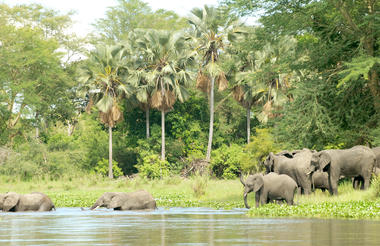
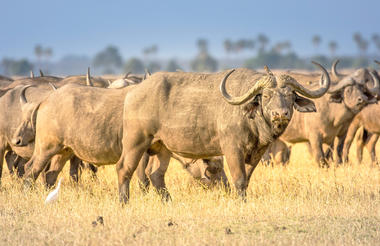
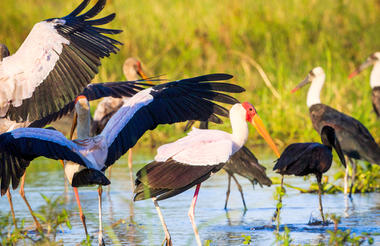
2 game-viewing activities per day
Guided walks (typically early morning) are also available but are extra and charged at US$20 per person.
A full day to enjoy the game viewing on offer from Mvuu Camp. The Camp offers two scheduled game viewing activities per day - a morning boat safari and an afternoon game drive.
Liwonde offers some of the best river-based elephant, crocodile, hippo and general wildlife viewing in Africa. The boat safaris are slow, drifting down the river with plenty of opportunities to stop and take photos of hippos floating in the shallows - jammed into each other like a big hippo puzzle, enormous crocodiles sunning themselves on the banks, and as the morning heats up herds of elephant coming down to the water’s edge for a much-needed drink…
The afternoon game drives are an opportunity to reconnoitre the floodplains north and south of the camp. You can expect to see of herds of shaggy grey waterbuck, graceful golden impalas, timid kudu, warthog and elephant. Towards sunset, your guide will find a peaceful spot to stop and admire the views accompanied by a sundowner drink, and afterwards you will take a night drive back to camp , seeing the shapes of the forests by the light of the spotlight, and occasionally seeing some of the night animals like genets, mongooses, civets and owls.
In addition, on request, guests can also visit the nearby Nanthomba School whose construction was the brainchild of Mvuu employees.



Another packed day of safari activities from Mvuu.
Liwonde has an underground hide near a waterhole where you can watch the animals at eye level as they come to drink, so you may spend some time here... Hopefully you'll be richly rewarded by sightings of sable, hartebeest, eland, zebra, warthogs, bushpigs, guinea fowl, elephant and just possibly black rhino!
In the last few years, there have been some exciting changes in Liwonde thanks to African Parks. In 2017 four cheetahs were re-introduced into the park and visitors have since been treated to regular sightings close to Mvuu Lodge and Camp. And in 2018 a small pride of lions - two males and two females - were released so hopefully you will hear these magnificent creatures roaring in Liwonde once more...



Another packed day of safari activities from Mvuu.



This morning you set off for Lake Malawi and Mumbo Island, where you'll spend the next 3 nights in barefoot luxury on a Robinson Crusoe like island.
Mumbo Island is only 1km in diameter, and unlike most island destinations in the region, has never been populated and is still in its natural state with a thick covering of ancient fig trees, baobabs and tropical plants. The sandy beaches and rocky shoreline are lapped by crystal clear waters, and beneath the waves the water teams with small colourful Cichlid fish. The island is home to rainbow coloured skinks and water monitor lizards, and bird life is abundant. African fish-eagles perch proud in the very tops of the trees while shier forest birds like the African paradise-flycatcher inhabit the bush around the tents.
This tiny camp is cleverly built around the high rocks overlooking the water and is designed so that is can be removed without leaving a trace. Everything is made of timber, thatch and canvas; water is pumped from the lake by a solar pump and filtered on the island; and cooking is done on gas or a rocket stove.
Each of the five twin tents sits on a shady wooden deck and has a separate en-suite bathroom complete with bucket shower and eco-loo. A hammock provides a comfortable spot to take in the panoramic lake views!
Please note: Mumbo Island is off the grid - to preserve as light a footprint as possible paraffin and solar lights are used.
Journey time - 3 to 4 hours



Spend a dreamy, lazy day on Lake Malawi swimming, snorkelling, pottering around in boats and relaxing in this idyllic setting.
If you fancy being more active there are some good walks on the walking trails around the island and it's also worth making the journey around the island by kayak.



Another dreamy, lazy day by the Lake...
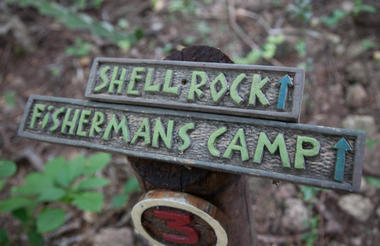
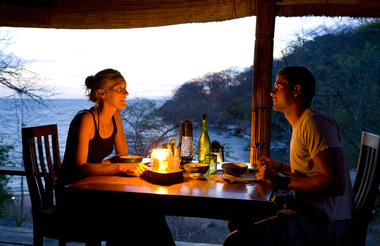
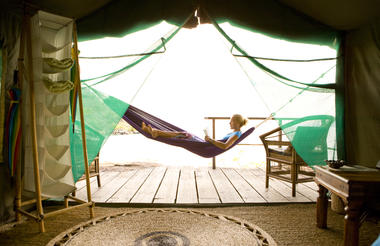
Today after an early breakfast you will return to Lilongwe International Airport for your flights home.
Journey time - approx 4 hours






